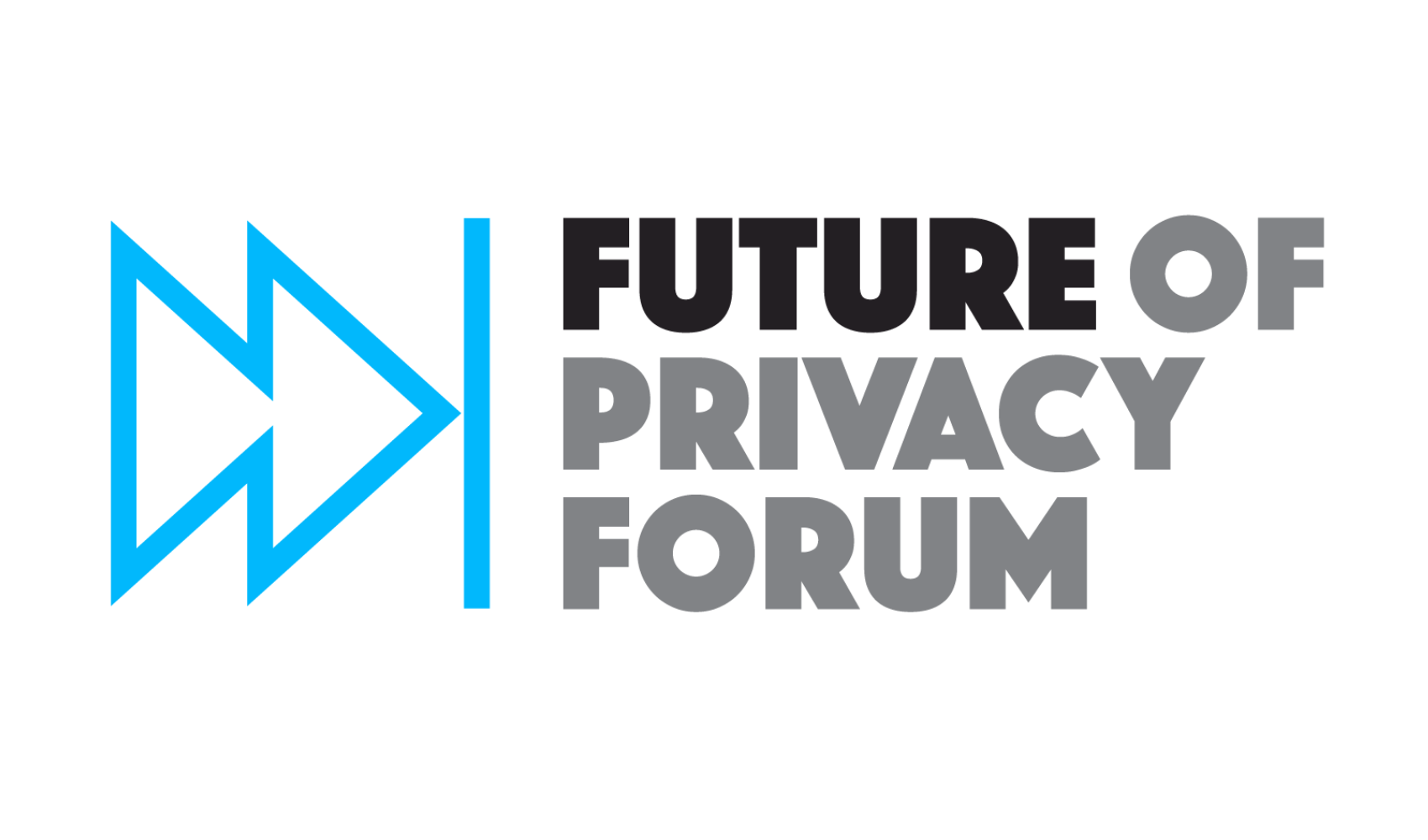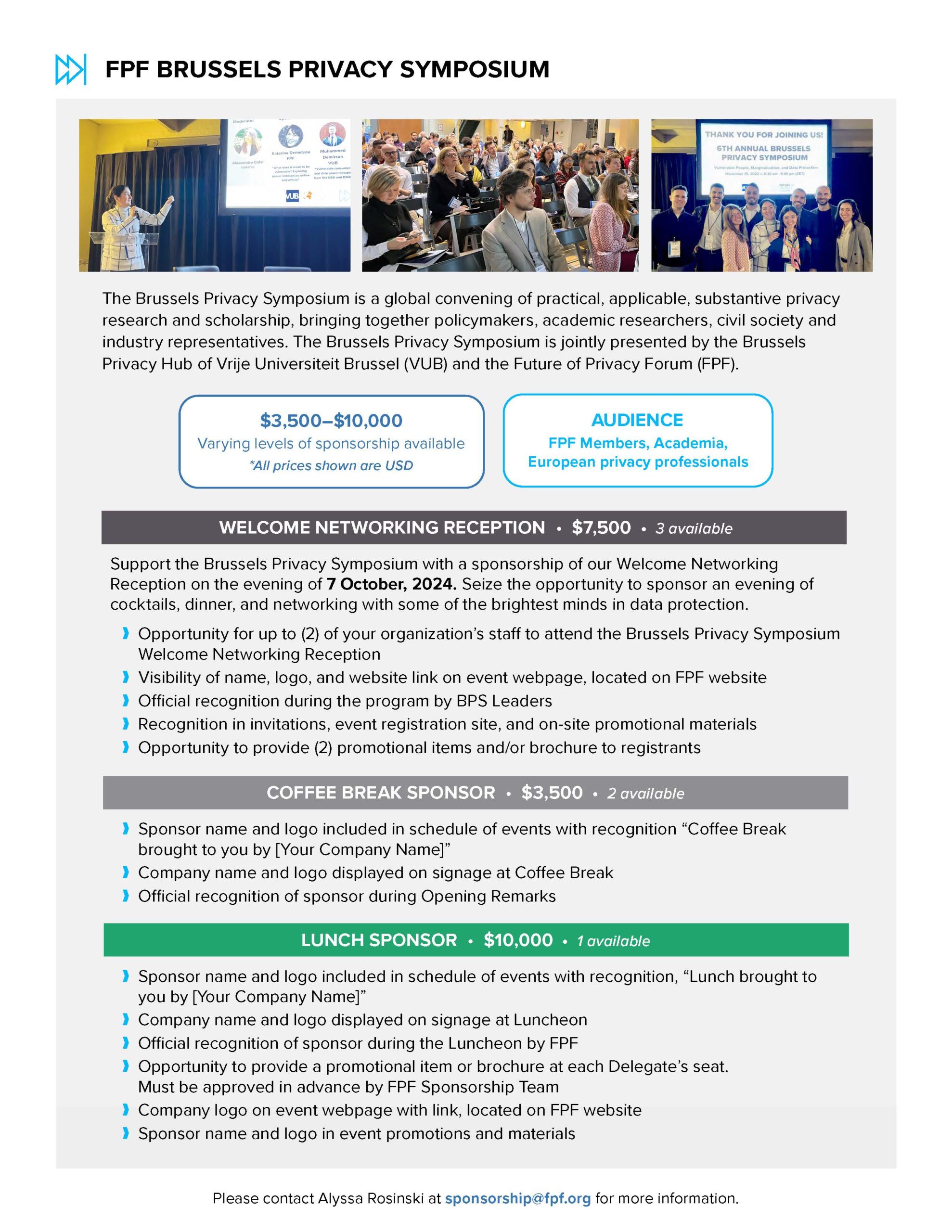9:00 am –
9:30 am CET
|
Welcome Coffee, Light Bites, & Registration
|
|
9:30 am –
9:35 am CET
|
Welcome & Introduction by Co-hosts
|
Co-Hosts
- Dr. Gabriela Zanfir-Fortuna, VP for Global Privacy, Future of Privacy Forum
- Prof. Gianclaudio Malgieri, Associate Professor & Co-Director, Leiden University & Brussels Privacy Hub
|
9:35 am –
10:00 am CET
|
Opening Keynote
The Digital Challenge for the New Commission
The incoming European Commission has a double challenge. It must effectively enforce a new generation of digital rules that interplay and, in some instances, contradict each other. And it must also demonstrate the European Union’s regulatory response — in an era of global competitiveness, technology’s intersection with geopolitics, and uncertain politics, both within the 27-country and with key allies — to digital is fit for purpose to a wider world increasingly skeptical of the so-called “Brussels effect.”
|
Mark Scott, Senior Resident Fellow, Atlantic Council
|
10:00 am –
10:45 am CET
|
Panel I – Unpacking Notions of Risk: From the Data Protection Impact Assessment to Generative AI Systemic Risk, and Back Again
Notions of risk and their often-complex relationship to a variety of tools and assessments designed to address them form an integral part of the AI Act, the Digital Services Act (DSA), and the GDPR. There are at least three parallel references to risk in the AI Act alone:
- The systemic risk assessment for Generative AI purposes (Article 51);
- The Fundamental Rights Impact Assessment (FRIA) to be carried out by deployers governed by public law or by private entities providing public services (Article 27);
- The Conformity Assessment for high-risk AI systems (Article 6(1)(b) – Article 43).
The AI Act’s Annex 4 on “Technical Documentation” further outlines the requirement for AI system providers to share detailed documentation on the technical elements, development process, and risk management process of the relevant AI system, possibly signaling towards an additional assessment.
The Digital Services Act (DSA) also requires VLOPs and VLOSEs to assess systemic risk (Article 34) stemming from the design or functioning of their services and systems.
Considering the complexity and differing notions of risk across the EU data governance ecosystem, this panel will unpack the following questions:
- After the troubled waters of the “risk to fundamental rights” definition in the GDPR DPIA, we now have the notion of systemic risk in the DSA and the Gen AI rules of the AI Act. Is the concept of risk the same across the different pieces of legislation?
- What might be the risk parameters? What makes a risk “systemic”?
- Can we use the same methodology and steps in the different Impact Assessments across the digital rulebook, or can each tool learn from the others?
|
Moderator
- Prof. Gianclaudio Malgieri, Associate Professor & Co-Director, Leiden University & Brussels Privacy Hub
Panelists
- Maryant Fernandez Perez, Head of Digital Policy at The European Consumer Organization (BEUC)
- Dr. Laura Caroli, Former Senior Policy Advisor at the European Parliament
- Lorelien Hoet, Government Affairs Director, Microsoft
- Niels van Dijk, Associate Professor, Vrije Universiteit Brussel
|
10:45 am –
11:15 am CET
|
Coffee Break
Sponsored by K-ID
|
|
11:15 am –
11:30 am CET
|
Lightning Talk: The Brussels Effect in Global AI Regulation: Reflections from Brazil
|
Lucas Anjos, Postdoctoral Researcher at SciencesPo & Data Protection Specialist in the International Affairs Unit of the Brazilian Data Protection Authority (ANPD)
|
11:30 am –
12:15 pm CET
|
Panel II – The Sensitive Personal Data Spectrum: From Obligations to Prohibitions
By following the threat of sensitive personal data throughout the EU data strategy package, a series of prohibitions and obligations emerge that significantly highlight the areas of interplay between the AI Act, the DSA, and the GDPR.
Notably, we find that Article 26(3) of the DSA prohibits presenting ads to users based on profiling, as defined by Article 4(4) of the GDPR, and on the basis of the processing of their sensitive personal data, as defined by Article 9 of the GDPR. Similarly, Article 28(2) of the DSA prohibits targeted advertising to minors on online platforms based on profiling.
Finally, Article 10(5) of the AI Act contains an exception to processing special categories of personal data for the purposes of detecting and correcting bias, which applies to providers of high-risk AI systems.
This expert panel will aim to address the importance of balancing prohibitions and obligations for sensitive personal data processing, the practical challenges that accompany this task, and how to approach it from the GDPR, DSA and AI Act perspectives.
|
Moderator
- Michael van den Poel, Research Engineer, EDHEC Business School
Panelists:
- Emerald de Leeuw-Goggin, Global Head of Privacy and AI Governance, Logitech
- Lex Zard, Technology and Human Rights Fellow, Harvard Carr Center for Human Rights
- Kim Smouter-Umans, Executive Director, European Network Against Racism (ENAR)
|
12:15 pm –
1:15 pm CET
|
Lunch Break
Sponsored by Wilson Sonsini
|
|
1:15 pm –
2:00 pm CET
|
Breakout Workshops – Have your Say!
Now a Brussels Privacy Symposium tradition, the workshops are a great opportunity to explore topics beyond the program in dynamic and creative ways, through four parallel tracks.
After hearing from leading experts on the topics of the Symposium, participants are invited to share their own thoughts in parallel Breakout Workshops. Asking both creative and practical questions, such as – “Should we be able to give consent to ChatGPT?” – and through a series of engaging formats, expert facilitators will guide a series of practical and dynamic Workshops to beat any post-lunch dip.
|
Workshop Facilitators:
- Bárbara Lazarotto & Pablo Trigo Kramczac, VUB & Brussels Privacy Hub
- Topic: Should we be able to give consent to ChatGPT?
- Andreea Şerban, FPF & Vincenzo Tiani, PANETTA
- Topic: The Right to Explanation Across GDPR & AI Act
- Ingrida Milkaité, University of Ghent
- Topic: Safe Play: Designing Privacy Friendly and Age-Appropriate Digital Playgrounds for Tomorrow’s Gamers
|
2:00 pm –
2:15 pm CET
|
Reporting back from Workshops
Join us back in plenary as we share key learnings and take-aways from the Breakout Workshops.
|
Speakers:
|
2:15 pm –
2:45 pm CET
|
Honored Guest Speaker Talk: Bits on the Digital Services Act from a Computational Perspective
|
Speaker: Adriana Iamnitchi, Professor, Chair of Computational Social Sciences, Maastricht University
|
2:45 pm –
3:15 pm CET
|
Coffee Break
|
|
3:15 pm –
4:00 pm CET
|
Panel III – Regulatory Perspectives and AI Enforcement – A Case of Double Jeopardy?
The EU Data Strategy Package brings with it a complex enforcement landscape, where several authorities aim to cooperate effectively in order to avoid a case of “double jeopardy.”
The recently-established AI Office, under the auspices of the European Commission, will play a key role in the implementation of the AI Act, especially with regards to general purpose AI. At the same time, over the past two years, Data Protection Authorities (DPAs) have taken action against deployers of AI systems on the basis of the GDPR, and have included the supervision of AI systems and algorithms in their current and future strategies.
We are also seeing the appointment of existing, national regulatory bodies as supervision and enforcement authorities to oversee the implementation of different laws within the EU Data Strategy Package.
As we look towards the immediate and long-term enforcement future, this expert panel will address some central questions:
- Who are the AI enforcers?
- How will national and European authorities collaborate with one another on AI enforcement?
- What role will standardisation play in the governance of the AI Act?
- What are DPAs’ perspectives on AI enforcement?
|
Moderator
- Bianca-Ioana Marcu, Deputy Director for Global Privacy, Future of Privacy Forum
Speakers
- Sven Stevenson, Director Coordination Supervision on Algorithms, Dutch Data Protection Agency
- Yordanka Ivanova, Legal and Policy Officer, AI Regulation and Compliance team, AI Office
- Chiara Giovannini, Deputy Director-General, Senior Manager Policy & Innovation, ANEC – the European Consumer Voice in Standardisation
- Thiago Moraes, Brazilian Data Protection Authority (ANPD)
|
4:00 pm –
4:20 pm CET
|
Closing Reflections: In Conversation with Wojciech Wiewiórowski & Prof. Dr. Gloria González Fuster
|
|
4:20 pm –
4:30 pm CET
|
Closing Remarks & Thank You by Organizers
|
- Dr. Rob van Eijk, Managing Director for Europe, Future of Privacy Forum
- Professor Sophie Stalla-Bourdillon, Brussels Privacy Hub
|
4:30 pm –
6:00 pm CET
|
Bites & Cocktail Reception
Join us for further conversation over drinks and snacks to close the day.
|
|







